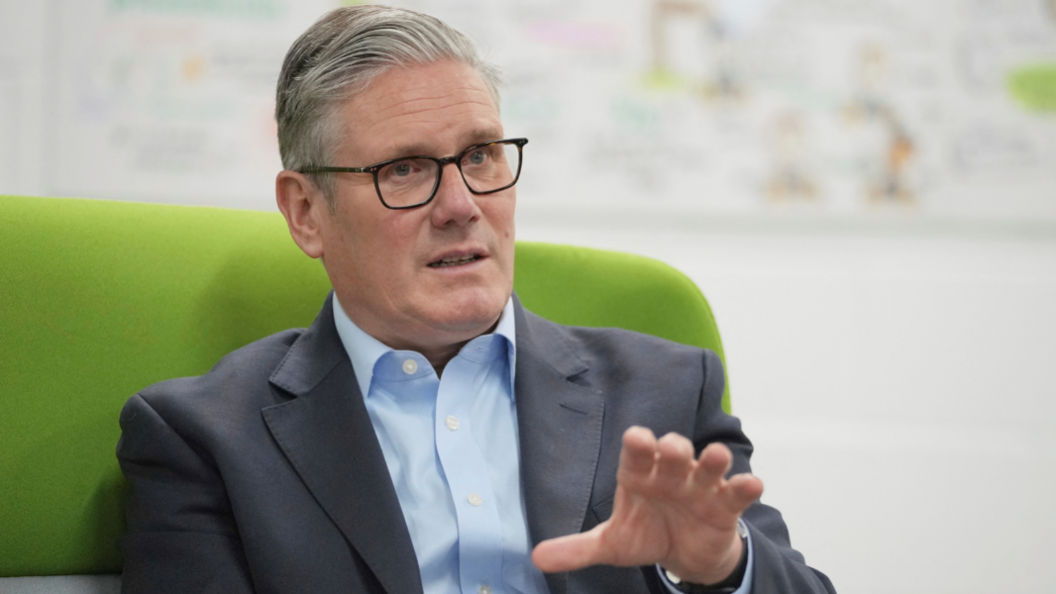PM denies bowing to political pressure over winter fuel

- Published
Sir Keir Starmer has denied his government's U-turn on winter fuel payments was a result of political pressure, instead arguing it was possible because of an improved economy.
Speaking to Jeremy Vine on BBC Radio 2, the prime minister defended last year's decision to withdraw the payments from all but the poorest pensioners, saying that he had to take "difficult" action to fix the UK's "broken" finances.
He said "better growth" in the UK meant he could now extend the payment, worth up to £300 a year, to more pensioners this coming winter.
Although the country's economic growth was better than expected in the first quarter of 2025, analysts expect it to slow in the coming months.
Last July, the government announced it would be taking away the payments from more than 10 million pensioners.
It meant that last winter only those receiving pension credit or another means-tested benefit were eligible - an estimated 1.5 million individuals.
However, following pressure from charities, unions and the party's own backbench MPs, the Labour government announced it would partially reverse that decision, expanding eligibility to more than three-quarters of pensioners.
Under the revised policy, nine million pensioners in England and Wales with an annual income of £35,000 or less will get the payment this winter.
The winter fuel payment U-turn in numbers
- Published9 June
How much is the winter fuel payment and who will get it?
- Published16 September
Asked if he had panicked following political pressure, Sir Keir said "no" adding: "I knew the decision we were taking in autumn of last year and why we had to take it."
"The economy was broken, we discovered a £22bn black hole. To be honest with you, I had to take a decision in that Budget which was - do we ignore the big hole or do we actually deal with," he said.
"I thought the right thing to do was to deal with it - that meant tough decisions."
He said better-than-expected growth figures, falling interest rates and trade deals with the US, India and the EU meant the government was able to increase the eligibility threshold for the payment.
Earlier Energy Secretary Ed Miliband told the BBC Chancellor Rachel Reeves would not apologise for decisions she took in last year's Budget and argued she deserved "credit" for listening to "the strength of feeling" from voters.
Pressed on how the government would pay for the change, which is expected to cost around £1.25bn, Miliband said it was a "a relatively small amount of money" and could be accommodated, with details to be set out in the autumn Budget.
The government has said the change would "not lead to permanent additional borrowing".
Speaking in Parliament on Monday, Conservative shadow work and pensions secretary Helen Whately said: "It is outrageous to claim that the economy has somehow improved from the day they made the cut, and they know it."
She said "by almost every metric, the opposite is true" pointing to rising unemployment and growth forecasts.
Whately added that the government had failed to provide answers as to how it would pay for the U-turn and had instead "kicked the can down the road until the Budget".
Liberal Democrat Treasury spokesperson Daisy Cooper said: "If the government is truly sorry it would backdate these payments to those who are now eligible."
However, Paul Johnson, head of the Institute for Fiscal Studies think tank, said extending the winter fuel payment "wouldn't be in the top 100 things" he would do if he had £1.25bn to reduce poverty.
"Almost none of the people impacted by this will be in poverty - most of them will be at least as well off as the average in the population," he told BBC Radio 4 PM programme.
"We know that poverty is much worse among families with children than it is with pensioners, and of course the poorest pensioners are already getting this."
The Resolution Foundation said the U-turn would create "new complexity" in the tax system and that any savings from the policy would be eaten up by the administrative cost of means-testing the payment.
The government said no one would need to register with HMRC or take any further action to receive payments, and pensioners who want to opt out will be able to do so through a system set to be developed.
On Monday, Labour backbenchers broadly welcomed the U-turn but renewed their calls for the government to rethink other cuts, including changes to disability payments.
Asked if she would reconsider the benefit cuts, Reeves argued the current system was "not sustainable".
She said the government would "always protect those that can't work" but added "more needs to be done to fulfil the ambitions of people with disabilities themselves to get back in to work".
Other Labour MPs have urged the government to scrap the two-child benefit cap, introduced under the previous Conservative government, which prevents most parents from claiming means-tested benefits for any third or additional children born after April 2017.
Pressed on the subject during a visit to Suffolk, Prime Minister Sir Keir Starmer said his government would be setting out its strategy on child poverty "later in the year".